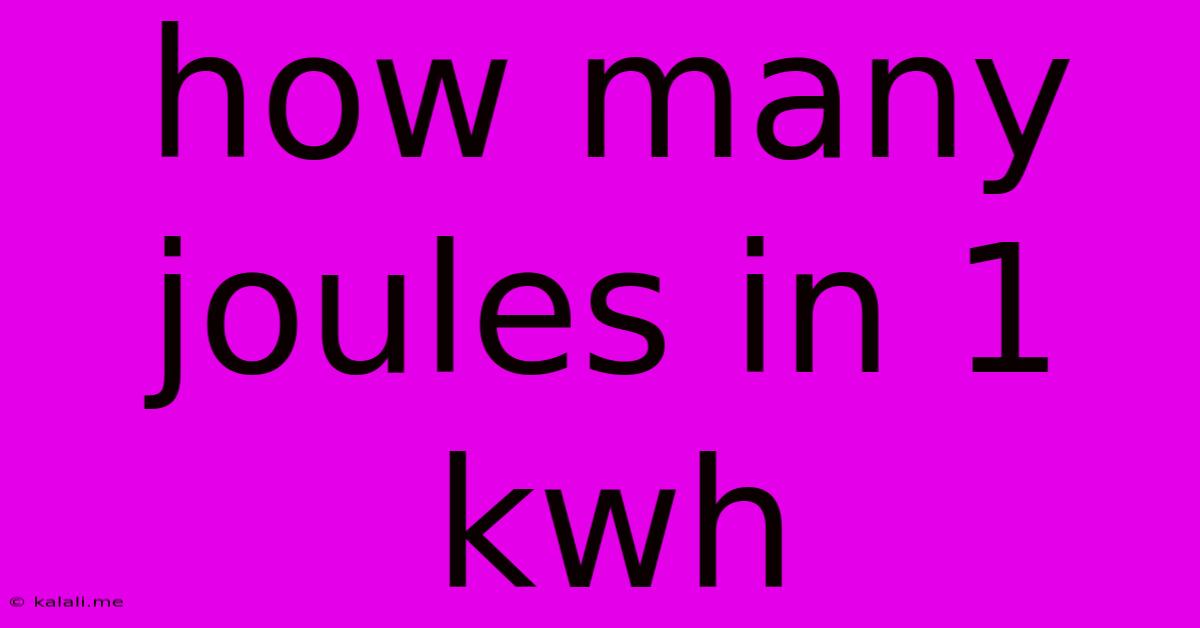How Many Joules In 1 Kwh
Kalali
Jun 13, 2025 · 2 min read

Table of Contents
How Many Joules are in 1 kWh? Understanding Energy Units
This article will clearly explain the conversion between kilowatt-hours (kWh) and joules (J), two common units for measuring energy. Understanding this conversion is crucial for anyone working with energy calculations, from physics students to those analyzing their electricity bills. We'll break down the process step-by-step, making it easy to understand for everyone.
What is a Joule?
A joule (J) is the standard international unit (SI unit) of energy. It represents the work done when a force of one newton is applied over a distance of one meter. It's a fundamental unit used across various scientific fields.
What is a Kilowatt-hour?
A kilowatt-hour (kWh) is a unit of energy often used in the context of electricity consumption. It represents the energy used by a 1 kilowatt (kW) appliance running for one hour. It's a more practical unit for measuring larger amounts of energy used in homes and businesses.
The Conversion: Joules to Kilowatt-hours and Vice Versa
The conversion between joules and kilowatt-hours is straightforward:
- 1 kilowatt (kW) = 1000 watts (W)
- 1 watt (W) = 1 joule per second (J/s)
- 1 hour = 3600 seconds (s)
Therefore, to convert kilowatt-hours to joules, we can use the following formula:
1 kWh = (1000 W) x (3600 s) = 3,600,000 J
This means that one kilowatt-hour is equal to 3.6 million joules.
Conversely, to convert joules to kilowatt-hours, you would use the inverse:
1 J = 2.77778 x 10<sup>-7</sup> kWh
Practical Applications and Examples
Understanding this conversion is important in many situations:
- Electricity Bills: Your electricity bill usually shows your energy consumption in kilowatt-hours. Knowing the joule equivalent helps you understand the total energy used in a more fundamental unit.
- Physics and Engineering: In various physics and engineering calculations, you may need to convert between joules and kilowatt-hours to ensure consistency in units.
- Renewable Energy: When comparing the energy output of different renewable energy sources (solar panels, wind turbines), understanding the conversion helps in evaluating their performance.
Beyond the Basics: Understanding Energy Consumption
While knowing the conversion factor is essential, understanding energy consumption patterns is equally crucial. Factors influencing your energy use include:
- Appliance Efficiency: Energy-efficient appliances consume less energy, reducing your kilowatt-hour usage and thus the total joules consumed.
- Usage Habits: Reducing energy consumption through mindful usage patterns, such as turning off lights and unplugging electronics when not in use, leads to significant savings.
- Energy Sources: The type of energy source (fossil fuels, renewable energy) also impacts the overall environmental impact of your energy consumption.
By understanding the relationship between joules and kilowatt-hours, you gain a deeper understanding of energy measurements and their implications in daily life and scientific applications. Remember the key conversion: 1 kWh = 3,600,000 J.
Latest Posts
Latest Posts
-
Which Of The Following Is Abiotic
Jun 14, 2025
-
Select All The True Statements About Temperate Coniferous Forests
Jun 14, 2025
-
Rest Mass Energy Of A Proton
Jun 14, 2025
-
Energy Stored In The Bonds Between Atoms Is Called
Jun 14, 2025
-
Which Statement About Cells Is True
Jun 14, 2025
Related Post
Thank you for visiting our website which covers about How Many Joules In 1 Kwh . We hope the information provided has been useful to you. Feel free to contact us if you have any questions or need further assistance. See you next time and don't miss to bookmark.